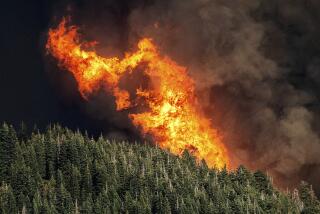What my kids don’t know about 9/11
- Share via
My family and I marked the 10th anniversary of 9/11 last year with a ceremony at the Los Angeles Fire Academy. Our daughters marveled at the enormous fire engine ladders, lifted toward the sky to proudly display an American flag.
The older one took pictures with my phone of a twisted piece of steel, a piece of the World Trade Center, pictures she would later share with her second-grade class.
They listened, as best they could, to speeches by the mayor and other politicians. They stood at attention as a bagpiper played taps.
PHOTOS: The terrorist attacks of Sept. 11, 2001
As a mother, I felt as if I’d found the perfect way to mark the solemn day. As a journalist, nothing felt right.
You see, when it comes to my kids, I’ve been holding back crucial details.
Our older daughter has long referred to 9/11 as the day when “the planes crashed into the buildings.” She has only recently realized there were people on those planes. And I’m not sure she has fully processed that they were mothers and fathers and children like her. Or that inside those buildings were people who went to work every day, just as her parents do.
PHOTOS: The world observes the 10-year anniversary of Sept. 11
While I answer both my daughters’ questions about the day honestly, I don’t volunteer much more detail. By holding back, I feel as if I am protecting something deep inside my children, the part of them that still believes that there are fairies living in a tree in our frontyard or that Santa and the Easter Bunny know their address.
Call it innocence, childhood, whatever. It seems worth safeguarding, preserving for a little while longer.
Those of us raised in the Information Age were weaned on our parents’ stories of where they were when they learned that President Kennedy, Robert Kennedy and Martin Luther King Jr. had been assassinated. My generation witnessed the underside of history on the January morning when the Challenger exploded as many of us watched in our classrooms.
And while I know that those events struck us to our core, I can’t help thinking that 9/11 is different. It wasn’t a horrible tragedy that affected important people. It wasn’t a distant war fought on foreign soil. It happened to us. People like you and me died. Everyday events and places were forever marred, their safety no longer a given.
But yet, what feels like current events to me is history to our daughters. The consequences from the day are commonplace for them, even if the details are not. The presence of American soldiers in Iraq and Afghanistan has been a given for their entire lives. They have never known a world in which you don’t take off your shoes before you board an airplane or undergo a body scan when you visit the Statue of Liberty.
Dr. David J. Schonfeld, the director of the National Center for School Crisis and Bereavement at Cincinnati Children’s Hospital, coordinated training for the New York City schools crisis team after 9/11. When I called him to ask whether I was doing the right thing, he was both approving and not. He’s for facts (“They’ll hear about it anyway”), but he acknowledges that explaining what happened on that day, and how we have all changed, is both “nuanced and complicated.”
Someday I will tell my daughters the whole story. I will tell of people jumping out of the burning buildings, a front page of horror so emblazoned on my memory that it never seems to recede.
I will tell how I wept when I read the obituary of a senior vice president at Cantor Fitzgerald who had been one year ahead of me at the small private school that my daughters now attend.
I will tell of the weeks I spent reporting on the day’s aftermath at LAX, when I became conditioned to run toward every siren and to see every distracted security guard as a weak link in a vital chain.
The conversation is not far off. But for now, those stories will have to wait. We moved this summer, and we need to make sure that Santa Claus knows our address first.
Cara Mia DiMassa, a former reporter and editor at The Times, is director of Summerkids Camp. CaraMiaDiMassa@gmail.com
More to Read
A cure for the common opinion
Get thought-provoking perspectives with our weekly newsletter.
You may occasionally receive promotional content from the Los Angeles Times.









